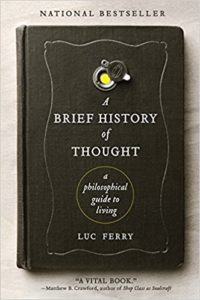 A Brief History of Thought: A Philosophical Guide to Living, by Luc Ferry (Harper Perennial, 2011, 282 pp.)
A Brief History of Thought: A Philosophical Guide to Living, by Luc Ferry (Harper Perennial, 2011, 282 pp.)
Last week the subject was the creation of our individual identity—what makes us who we are? This week’s subject is coming to terms with our place in the universe: how we should go about living our lives and coming to terms with our own death?
Luc Ferry is a French philosopher who has taken on the challenge of trying to make understandable to the general reader some very tangled philosophical questions about living and dying. He tries to answer the question put forth by his 16th-century countryman Michel de Montaigne, “How to Live?”
Since the dawn of time, men and women have looked up into the heavens and pondered their place in the universe. How are we supposed to conduct ourselves while we are here, and what happens to us when we die? The answers we’ve come up with range from Stoicism in Greek philosophy, through Christianity, Deism and the Enlightenment, Nietzschean postmodernism, and beyond. Ferry explores them all.
The ultimate question that philosophy seeks to answer is how do we go about living our daily lives without living in fear of our ultimate death? Especially as death comes in many forms, not just the literal death of the body. All through our lives we must come to terms with the end of things: jobs, careers, children who grow up, friends who move away, the seasons as they come and go, love that fades, things constantly changing all around us. All of these can cause the same anxieties as a literal death. We have to come to terms with the irreversibility of life, otherwise we spend all our days living with nostalgia, guilt, regret, and remorse, “those great spoilers of happiness.”
The ancient Greeks posited Stoicism: To conquer our fear of what we cannot change, we must start living in the here and now: “The present moment is the only dimension of existence worth inhabiting, because it is the only one available to us. The past is no longer and the future has yet to come . . .yet we live virtually all of our lives somewhere between memories and aspirations, nostalgia, and expectation.”
We all know the feeling: if I had another job, a bigger house, if I just lived by the beach, then I’d be happy.” As Seneca so wisely put it, “while we wait for life, life passes.” Accept that nothing is permanent, everything changes, and that the sooner you embrace this, the happier you’ll be. A good Stoical life is one stripped of both hopes and fears, a life that accepts the world as it is—without, however, succumbing to fatalism. As some have put it, “hope a little less, love a little more.”
Christianity followed and promised eternal life through faith in the redemptive love of God. The belief in an afterlife has proved so seductive—and has remained so for two millennium—that it conquered Greek philosophy, and all belief systems since have had to contend with it head-on.
The war between Reason and Faith that began during the Renaissance has continued through the Scientific Revolution, the Enlightenment, the Romantics, Nietzsche’s Will to Power, and all the philosophies that have followed. The battlegrounds are individual consciences and public statehouses, and the answers remain as tangled as ever.
Whichever philosophy we choose to guide our lives, however, it is an individual choice. Ferry reminds us that it is incumbent upon us therefore to respect the choices made by others who may disagree with us.
Tolerance and respect for the beliefs of others: perhaps the most elusive philosophy of all.

Tolerance and respect…both too rarely observed nowadays. How ’bout something on the art of compromise next.